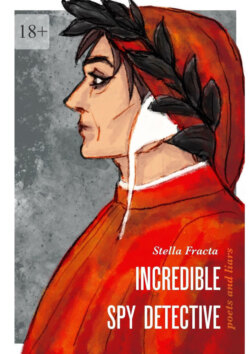Читать книгу Incredible Spy Detective. Poets and Liars - - Страница 8
6. Liars
Оглавление[Great Britain, London, City of Westminster]
“They told me once that all poets are liars … I thought about it.”
The voice reverberated across the ribbed ceilings of the crypt beneath the Church of St Martin-in-the-Fields. The decorations of medieval dungeons – wine cellars from the novel about the murder on vineyards – echoed the mystical mood of the meeting with the author.
Artificial lamps simulating candles lined the space. The columns dividing the hall into sectors disappeared above, supporting the arches of the ceiling. This place, both eerie and sacred, kept its own atmosphere even with the sounds of working photography equipment. Three hundred pairs of eyes were fixed upon the stage.
“Why write about things that don’t exist, why craft perfect worlds that will console nobody but the desperate? Heroes, villains, knights, beauties, beasts – abstract symbols echoed across every culture – but removed from objective reality. We live in a world with no black and white, on occasion we can’t choose what to wear, what wine to pair with our dinner – Barolo or Barbaresco,” Alexandra – Stella Fracta – raised her ruby drink, smiling ironically. “What is there to say about choice, then: between one’s own interests and the common good, instruction and justice, chaos and order – if one cannot be conceptualized without the other?”
Richard found himself getting confused. Sophistry – manipulating concepts that are valid separately and paradoxical together, deception through employing cognitive distortions and the imperfections of formal logic.
There are rules for resolving contradictions – preconceived instructions. For choosing between equivalent options, there’s chance and improvisation. For making decisions within a limited number of steps, there are real-time operating systems.
“I could say it in my own words, but this question was already answered by Vadim Rublev, doctor of philosophy, my teacher and the very Grandmaster whose encrypted poems my classmates and I translated into different languages ten years ago to practice the art of conveying meaning. I’ll quote – read from the sheet – because it, well, matters.”
She was smiling, she emphasized the last phrase with an ironic tone. She waved her free hand – still holding the wine glass in the other – like a magician. A piece of paper appeared in her fingers, and the audience gasped – from surprise and apt relief – while Alexandra continued.
“The world, peculiar and unfamiliar, made of metaphors and images, the one legends and songs are composed about, really did exist once. It is the poet’s task to salvage this fickle mist, the fragile gift, the memory and faith, to save it while wandering in the darkness, to carry it through generations so that, when the age of light comes again, love and goodness can be gifted to the rising scarlet sun.”
Hope and goodness – for them to simply be. Simply so they are passed on … The same instinct, embedded in our genes.
For some reason, Richard wanted to leave.
“The poet is chosen to be the one to, against all odds, continue to speak about the utopia. He’s chosen to pass on what must be saved – because that is our reality, it demands a coordinate system, the rules of the genre.”
He felt like he understood – but at the same time, he was unsettled. When the inner beast senses danger, when his arm hairs stand on ends beneath his shirt, when a shiver runs down his spine … She speaks about alchemy, because that’s how it must be – because it must be passed on and heard.
This is her legacy – humanity’s legacy. Poets lie to cocoon the core of truth in lies, to let lies wear down with time, but help the truth survive – and endure until the moment when neither masks nor weapons nor espionage nor the skill of puzzle-solving will be necessary.
Richard was never a poet in any sense of the word, yet now he realized that his coordinate system, his utopia – the struggle between order and chaos, friends and foes – were just the rules of the genre.
Just that.
Suddenly, he felt an unbearable need to approach Alexandra and ask her what he should do when the boundaries of the rule of the genre, seen clearer than ever before, begin to resemble cage bars.
He also wanted to ask why this was the image that came to his mind.
